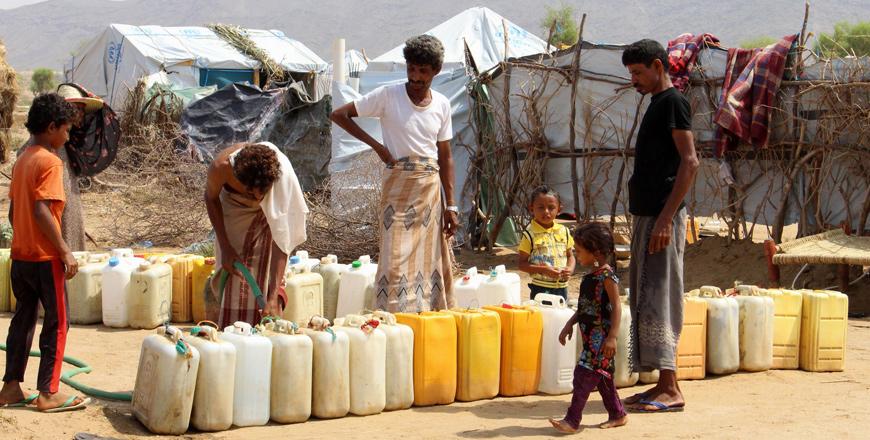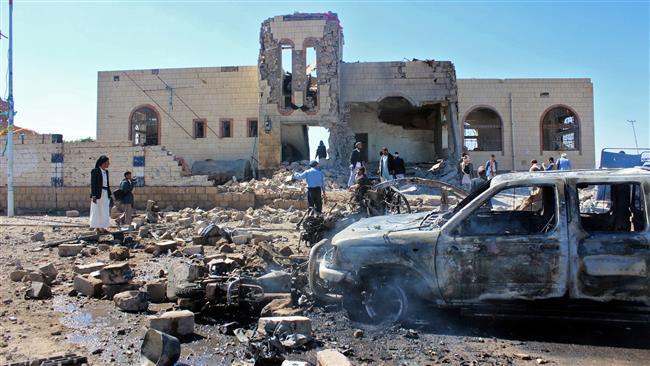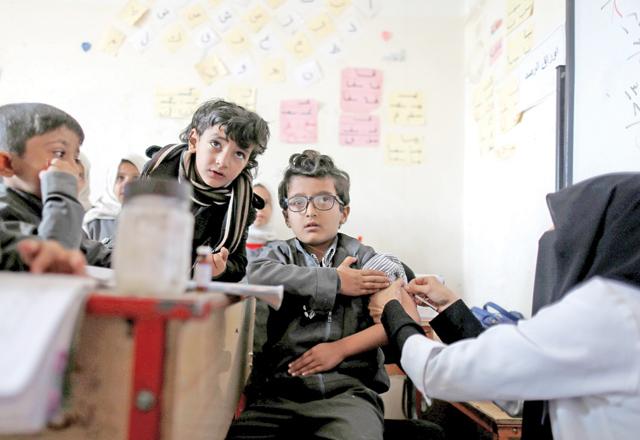You are here
Renewed battle for Yemen’s Hodeida sparks humanitarian crisis fears
By AFP - Sep 19,2018 - Last updated at Sep 19,2018

Displaced Yemenis from Hodeida fill their water barrels at a makeshift camp in a village in the northern district of Abs in Hajjah province on Sunday (AFP photo)
ADEN — Saudi-backed government forces in Yemen launched a series of attacks on rebel-held Hodeida, military officials said Tuesday, raising fears of a humanitarian crisis as an 11-week pause in the battle for the port city ended.
The Houthi rebels accused the government and its Saudi-led allies of deliberately targeting food warehouses on Monday night, as the coalition said it had resumed a “military operation to liberate Hodeida and its port”.
The fight for Hodeida, which the Houthis seized in 2014, had been put on hold for 11 weeks as the United Nations struggled to bring warring parties to peace talks in Geneva.
But the talks collapsed earlier this month after the northern Yemeni rebels failed to turn up in Geneva.
The Red Sea port of Hodeida is a vital lifeline for aid shipments to Yemen, the most impoverished country in the Arab world.
The United Nations has warned that any major fighting could halt food distributions to eight million Yemenis dependent on them for survival.
‘Deliberate targets’
Brigadier General Ali Al Taniji, commander of coalition forces on Yemen’s west coast, confirmed the alliance had launched an operation in Hodeida, in a statement to state media in the United Arab Emirates, Saudi Arabia’s main partner in the coalition.
Speaking on condition of anonymity, a senior coalition official told AFP the operation was being fought on multiple fronts.
Residents in and around the city, home to a population of 600,000, reported hearing explosions throughout Monday night.
The Houthis accused the coalition of targeting food supply warehouses in the raids, charging the international community was complicit in the attacks.
“International food supply warehouses were targeted in Hodeida, a clear sign that there is a plan... to make warehouses and densely populated neighbourhoods legitimate targets of their terrorist operations,” said the head of the rebels’ Supreme Revolutionary Council, Mohammed Ali Al Houthi.
“International tolerance of terrorism has only encouraged [the coalition] to plan and deliberately commit crimes,” Houthi said.
A spokesman for the Saudi-led coalition did not respond to a request for comment, while a World Food Programme spokeswoman declined to comment on whether the UN agency’s facilities had been hit.
UN envoy leaves Sanaa
Saudi Arabia and its allies accuse the Houthi rebels of smuggling arms from Iran through Hodeida and has imposed a partial blockade on the port.
The Houthis and Iran both deny the charges.
UN envoy Martin Griffiths left the Yemeni capital Sanaa on Tuesday, ending a three-day trip.
Griffiths is pushing for new peace talks after proposed negotiations between the Houthis and government fell apart in Geneva earlier this month when rebel delegates failed to show up, who say they had not received guarantees for their safe return home afterwards.
The United Nations on Monday announced it was working to open a humanitarian air bridge to transport Yemeni cancer patients abroad for treatment.
The Houthis said plans to fly patients out of Sanaa on Tuesday had been foiled by the coalition, accusing it of failing to cooperate.
World Health Organisation spokeswoman Fadela Chaib told AFP there was “no date set for the first flight” pending “final approval from all parties”.
While the rebels control the capital, home to Yemen’s main international airport, Saudi Arabia and its allies control Yemen’s airspace. Sanaa International Airport is currently under blockade.
Letter to Guterres
In wheelchairs and carrying sick babies, Yemenis in the rebel-held capital lined up Tuesday outside the health ministry as rumours of the impending flight spread.
Ahmed Awad Bin Mubarak, Yemen’s ambassador to the UN, said his government was willing to “do whatever it takes to alleviate the suffering and pain of Yemenis”, in a letter to Secretary General Antonio Guterres.
But he asked that the UN and all its branches not sign agreements or memoranda “except with the legitimate, internationally recognised government of Yemen”.
Saudi Arabia and its allies launched a major operation to retake Hodeida in June. The port is the entry point of most of Yemen’s imports and aid.
The troops, backed by coalition air strikes, have retaken a number of towns across Hodeida province but have not yet breached the city.
In July, the coalition announced it would temporarily suspend its offensive to give a chance to UN-brokered peace talks.
The Saudi-led alliance intervened in the Yemen conflict in 2015 in a bid to bolster embattled Yemeni President Abed Rabbo Mansour Hadi, whose government is recognised by the United Nations, in his war against the Houthis.
Nearly 10,000 people have since been killed and the country now stands on the brink of famine.
Related Articles
SANAA — At least 20 people were killed on Thursday in air strikes at the entrance of a hospital and a fish market in Yemen’s rebel-held port
SANAA — Yemen’s Houthi rebels announced a two-week pause in Red Sea operations on Wednesday, after attacks against Saudi tankers last week p
SANAA — Food aid in a warehouse on the frontlines of the Yemen war is at risk of rotting, the UN said Monday, leaving millions of Yemenis wi
















